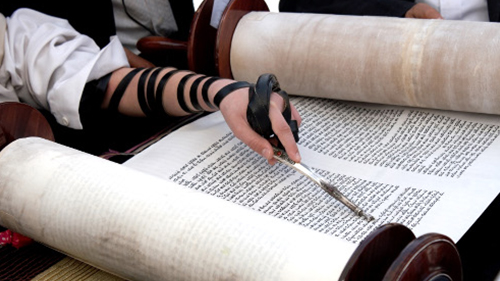The rabbinic conference in Columbus, Ohio 1937 must have been fraught and tense – the Reform movement in the United States was on the edge of redefining its relationship to a personal God and to Israel – and some rabbis felt that the core values of Reform Judaism were on the chopping block.
Passover is on the way. Time to put away the hametz and get set for the “yumminess” provided by matzah. It’s not good enough to just avoid purchasing leavened goods; rather we must actively seek out any remnants of these items in the house and dispose of them. Or at the very least, loan them out. We engage our broomsticks and search for and sweep up those leftover crumbs. Just as important, we need to identify the metaphorical hametz that provides excuses for our inaction. This too ought to be a planned precise procedure. We know deep down in our hearts that in emerging from the winter months, we should gear ourselves up for renewal. Passover is a perfectly suited opportunity to inspire us to serve as advocates for a compassionate globe.
It’s wonderful having an office overlooking the Old City of Jerusalem. When the weather is nice I sometimes skip lunch in favor of exploring the winding alleys of Jerusalem. It’s an opportunity for a bit of much needed exercise in addition to amazing people watching and window shopping. During one of these recent lunchtime outings […]
There seems to be a growing gap between Israeli and Diaspora Jews – whether the issue is controversy over the egalitarian prayer space at the Kotel, or over the attempts of the ultra-Orthodox rabbinate to gain a monopoly over conversions, or over the growing racism among sectors of the population. Was there ever a time when our people enjoyed unity? And is there a way to achieve that state today? A commentary to our double Torah portion, Vayakhel-Pikudey, suggests that there was indeed such a time.
My brother-in-law has many talents. In addition to playing the banjo, he’s a builder and carpenter; attorney specializing in environmental issues; and all around good guy. But his passion is olive farming…
But Moses’ father-in-law said to him: “The thing you are doing is not right. You will surely wear yourself out and these people as well. For the task is too heavy for you. You cannot do it alone.” (Exod. 18:17-18) People who criticize the Bible as being irrelevant to the present are usually the ones […]
Go, worship the Lord your God! Who are the ones to go? Moses replied, “We will all go, young and old. We will go with our sons and our daughters, our flocks and our herds; for we must observe the Lord’s festival.” (Exod. 10:8-9) Jewish tradition declares that “God, Israel and the Torah are One.” […]
God spoke to Moses and said to him, “I am the Lord. I appeared to Abraham, Isaac and Jacob as El Shaddai, but I did not make Myself known to them by my Name [Yod, Hay, Vov, Hay].” (Exod. 6:2-3)
Judaism has always shown its reverence for the name of God by the tradition of not pronouncing it. Thus, the letters Yod, Hay, Vov, Hay are combined with the vowels for Elohim and the pronounced word Adoshem or “Lord” is substituted for the vocalization.
The Torah portion Va’yechi is the concluding parsha of the first book of Torah, B’reishit. It ends the narrative of the founding mothers and fathers of our folk and faith, and also concludes the complex and compelling story of Joseph. As such, it has many aspects of endings, including Jacob’s death-bed blessings given to his sons and grandsons plus explicit instructions regarding his burial.
But Jacob said, “No, I pray you; if you would do me this favor, accept from me this gift; for to see your face is like seeing the face of God and you have received me favorably.” (Gen. 33:10) Few narratives in the Bible have touched me as deeply as does the story of Jacob’s reconciliation with his brother, Esau, as recounted in this week’s parashah.


